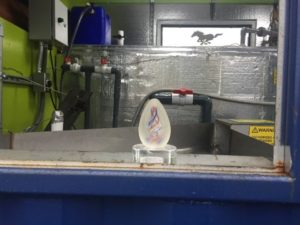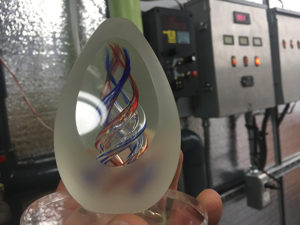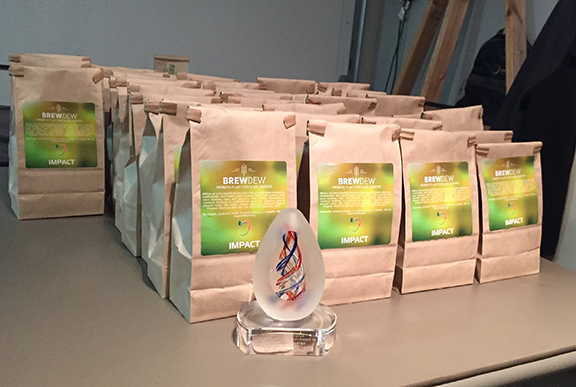Impact Bioenergy received the first annual CleanTech Vision Award – an honor that recognizes emerging technologies set to change the sector. Launched in 2014, the company is helping businesses, universities, restaurants, breweries and even islands turn their organic waste into energy and organic plant food. To give the CleanTech Alliance and its members a better picture of Impact Bioenergy’s work, Business Development Director Michael Smith took the Vision Award, nicknamed “10,” on a tour of day-to-day activities. The nickname is an homage to the CleanTech Alliance’s 10th Anniversary celebration where the company received the award and a nod to 11, from “Stranger Things” and her superpowers.
“We really appreciate the support from CleanTech Alliance and the ecosystem it has created,” Smith said. “It is extremely beneficial to be a member, especially participating in events, and making connections with those who can help advance our mission from so many different angles.”
First stop: Fremont Brewing’s HORSE
One of Impact Bioenergy’s primary technologies is the HORSE – or High-solids Organics Recycling system with Electric output. The system is a microdigester designed to transform organic waste into renewable energy in the form of natural gas, and liquid plant food or fertilizer. The system produces zero waste. Fremont Brewing is one of six HORSE customers – and in November, “10” tagged along to help feed the microdigester spent yeast from the brewing process.
Second stop: A Ballard High School class of young botanists

In the summer of 2016, Impact Bioenergy was looking for field testers of a new product – BrewDew. BrewDew is an output of Fremont Brewing’s HORSE that can be used wet or dry as an organic fertilizer. In order to test the properties and benefits of the new product, the company needed beta tests for several different scenarios. While farmers are the primary testers, one unique group is India Carlson’s Ballard High School botany class.
“I had heard India was interested in having her students work on real projects from the community, and that the school had the necessary facilities,” Smith said. “I reached out and found both to be true – India is the science teacher we all wish we had.”
Last summer she worked with students setting up growth trials to measure the growth of tomato plants using different combinations of water and BrewDew. The initial trials yielded best results with dilution, and “10” went on a classroom visit to begin planning the next set of tests.
Third stop: Packaging BrewDew
While testing will provide more data and future improvements for BrewDew, the product has already proven effective enough to hit the retail shelves of Recology. “10” is pictured with a dried version of the BrewDew being packaged for the stores and online sales.
Final Stop: E8 meeting to expand partnership
Smith first learned about Impact Bioenergy when serving as an E8 fellow in 2014. In that role he and Srirup Kumar, who is now at Impact Bioenergy as well, helped the young company through the due diligence process.
“The HORSE concept hadn’t even been conceived at the time, but we were both really interested in staying involved with the company,” Smith said.

The pair dedicated a lot of time to help Impact Bioenergy launch its first project, and became part of the team in the process. As a result, E8 members were some of the first to invest in the company. Last month, Impact Bioenergy visited with the E8 members to continue that partnership as an official portfolio company.
